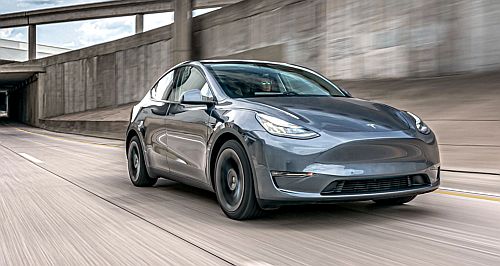News - Market Insight - Market Insight 2023Market Insight: Telsa makes EV sales soarMONOPOLY: EV ‘explosion’ rests on the success of only one brand, Telsa. Australian EV sales are expanding quickly, with Tesla models leading the charge5 May 2023 By NEIL DOWLING AUSTRALIA’S electric vehicle (EV) market is, apparently, booming. In the five months of this year, 23,888 battery-electric cars and SUVs have been sold which is already nearly three-quarters of all the EVs sold in the 12 months of 2022.
New players are arriving, and customers are becoming used to EVs as an alternative vehicle.
But while that is going in the right direction for Australia’s push to cut fossil-fuel related emissions, it is not as yet as sound as it could be. That is because the EV numbers are in the hands of one manufacturer – Tesla.
This year, Tesla sold 14,018 cars, all EVs. In perspective, that represents 59 per cent of the battery-electric (BEV) passenger car and SUV sector (not including hybrid and PHEV).
BEVs make up 9.2 per cent of the new car/SUV market in Australia and Tesla owns more than half (5.4 per cent of the new car/SUV market). Tesla has sold 8819 examples of its Model 3 in the five months of 2023, and 5264 of its Model Y.
Tracking that forwards for the full 2023 year, it has the potential to sell about 34,000 units – on par with Subaru and Isuzu Ute (which also has two models) and well ahead of Nissan and Volkswagen.
In April, Tesla sold 3676 units – Model 3 found 1581 buyers and Model Y sold to 2095 people – equivalent to all the sales that month of Suzuki, Jeep, Volvo, Skoda, and Renault.
By comparison, the next best BEV by sales was newcomer BYD with its Atto3 scoring 771 sales.
The Top 10 BEV sales list continues with the Volvo XC40 Recharge in fourth position with 347 sales; then the MG ZS EV (208); Polestar 2 (122); Volvo C40 (133); Kia EV6 (118); Hyundai Ioniq 6 (89); and BMW iX (71 sales).
For the year-to-date, Tesla tops the list again, but the order beneath gets shuffled as the Hyundai Ioniq 5 moves up (245 sales in the first five months) to just below the BMW iX but above the just launched Ioniq 6.
The Kia Niro EV is also up there, with 205 sales this year, while the most enduring BEV in Australia, the Nissan Leaf, bobs along with 159 sales to date.
The strength of Tesla is in its ability to reach high production volumes and enter export markets quickly all backed by strong customer demand. Price, with the Model 3 starting at $64,300 (plus costs) appears to be no barrier for buyers.
The Model 3 is Australia’s most popular mid-size sedan (in fact, best-selling sedan in any category) with 51 per cent of the segment (and 63.6 per cent of the $60,000-plus mid-size bracket).
In 2017, before Tesla joined the national vehicle registration data compiled by the FCAI, the Toyota Camry had 53.1 per cent of the mid-size car segment. It now has 11.0 per cent.
More changes to the established car brands are coming and with it, a greater presence of Chinese-made EVs (including Tesla) and a broadening of the models available.
New BEV models expected this year and next include the Toyota BZ4x and Lexus RZ, Polestar 3, MG4, Renault Megane E-Tech and the Peugeot e-2008.  |
Click to shareMarket Insight articlesResearch Market Insight Motor industry news |
















Facebook Twitter Instagram